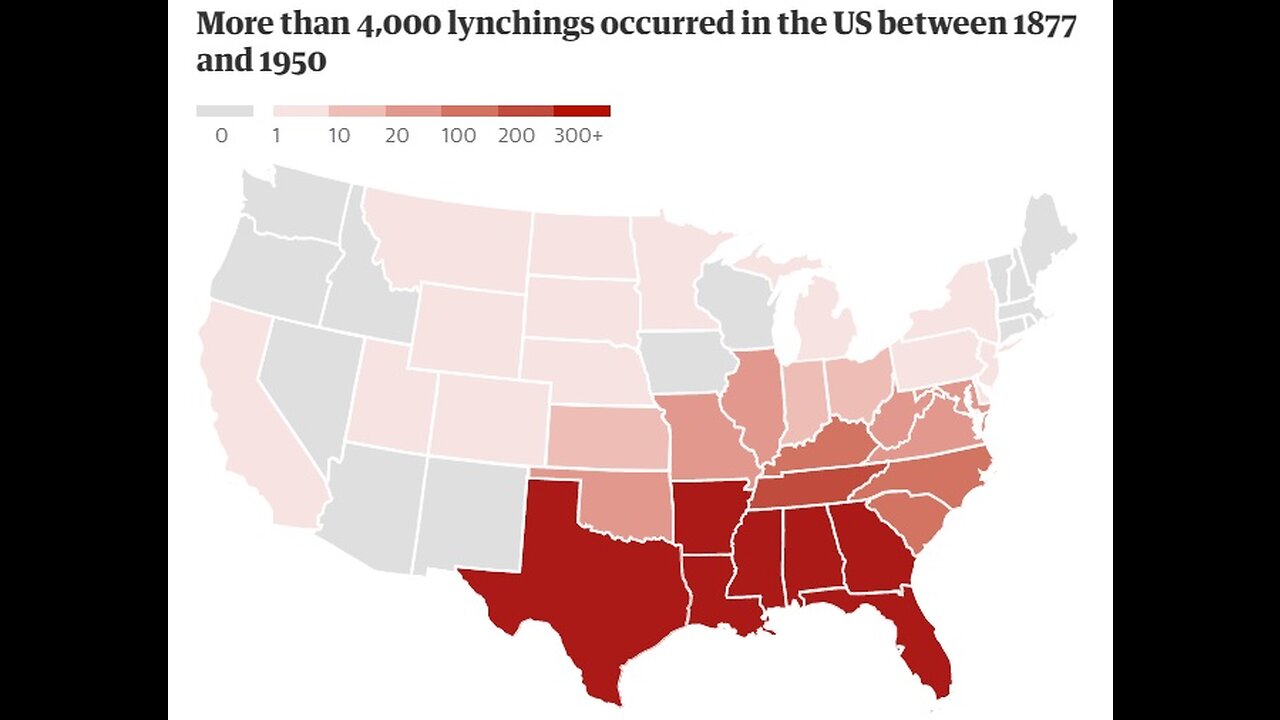Premium Only Content

The Origins of Lynching Culture in the United States in the South Documents Area
Lynching's took place in the United States both before and after the American Civil War, most commonly in Southern states and Western frontier settlements and most frequently in the late 19th century. They were often performed by self-appointed commissions, mobs, or vigilantes as a form of punishment for presumed criminal offences. From 1883 to 1941 there were 4,467 victims of lynching. Of these, 4,027 were male, and 99 female. 341 were of unknown gender, but are assumed to be likely male. In terms of ethnicity; 3,265 were black, 1,082 were white, 71 were Mexican or of Mexican descent, 38 were American Indian, ten were Chinese, and one was Japanese. At the first recorded lynching, in St. Louis in 1835, a Black man named McIntosh who killed a deputy sheriff while being taken to jail was captured, chained to a tree, and burned to death on a corner lot downtown in front of a crowd of over 1,000 people.
Lynching is a form of violence, usually murder, considered by its perpetrators as extra-legal punishment for offenders, or as a terrorist method of enforcing social domination. It is characterized by a summary procedure ignoring, or even contrary to, the strict forms of law. Lynching is sometimes justified by its supporters as the administration of justice (in a social-moral sense, not in law) without the delays and inefficiencies inherent to the legal system. Victims of lynching have generally been members of groups marginalized or vilified by society. The practice is age-old; stoning, for example, is believed to have started long before lapidation was adopted as a judicial form of execution. "Lynch law" is frequently prevalent in sparsely settled or frontier districts, where government is weak and officers of the law too few and too powerless to preserve order. The practice has been common in periods of threatened anarchy. In the early twentieth century, it was also found significantly in Russia and south-eastern Europe, but especially and almost peculiarly in America. When the debate over capital punishment itself has reached the level that many countries have abolished the death penalty even through the judicial process, the idea of lynching alleged offenders without any regard for their human rights can be understood as very wrong, and part of the dark history of humankind.
-
 8:23:08
8:23:08
What If Everything You Were Taught Was A Lie?
15 days agoMystery Of Tartarian And Hidden Evidence To Lost History 3,000+ Images Of Forbidden History
3.91K4 -
 3:45
3:45
BIG NEM
8 hours agoDiscover Your Ikigai: Finding Your Ultimate Purpose
6.5K1 -
 13:19
13:19
Dermatologist Dr. Dustin Portela
1 day ago $1.71 earnedDo You Have Sebaceous Filaments or Blackheads?
8.96K1 -
 2:21:35
2:21:35
Price of Reason
12 hours agoThe Establishment WORRIES about Elon Musk AGAIN! Superman Trailer Discussion! Sonic 3 Review!
39.6K3 -
 1:14:54
1:14:54
Steve-O's Wild Ride! Podcast
15 hours ago $15.64 earnedZac Brown Reveals The Secrets To HIs Success - Wild Ride #247
65.9K12 -
 4:16:43
4:16:43
JdaDelete
9 hours ago $11.48 earnedProject Zomboid with the Boys | The Great Boner Jam of 2025
41.3K -
 6:00:08
6:00:08
SpartakusLIVE
9 hours agoYoung Spartan STUD teams with old gamers for ultimate BANTER with a SMATTERING of TOXICITY
28.1K -
 1:50:39
1:50:39
Kim Iversen
11 hours agoShocking Proposal: Elon Musk for Speaker of the House?! | IDF Soldiers Reveal Atrocities—'Everyone Is a Terrorist'
73.9K168 -
 43:27
43:27
barstoolsports
14 hours agoOld Dog Bites Back | Surviving Barstool S4 Ep. 9
130K4 -
 5:13:04
5:13:04
Right Side Broadcasting Network
7 days agoLIVE REPLAY: TPUSA's America Fest Conference: Day One - 12/19/24
182K28